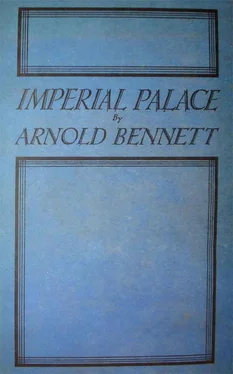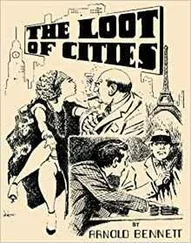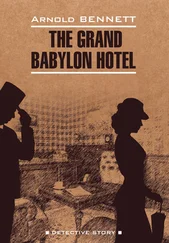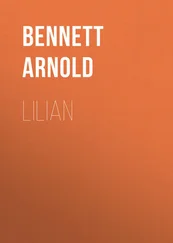Arnold Bennett - Imperial Palace
Здесь есть возможность читать онлайн «Arnold Bennett - Imperial Palace» — ознакомительный отрывок электронной книги совершенно бесплатно, а после прочтения отрывка купить полную версию. В некоторых случаях можно слушать аудио, скачать через торрент в формате fb2 и присутствует краткое содержание. Жанр: unrecognised, на английском языке. Описание произведения, (предисловие) а так же отзывы посетителей доступны на портале библиотеки ЛибКат.
- Название:Imperial Palace
- Автор:
- Жанр:
- Год:неизвестен
- ISBN:нет данных
- Рейтинг книги:4 / 5. Голосов: 1
-
Избранное:Добавить в избранное
- Отзывы:
-
Ваша оценка:
- 80
- 1
- 2
- 3
- 4
- 5
Imperial Palace: краткое содержание, описание и аннотация
Предлагаем к чтению аннотацию, описание, краткое содержание или предисловие (зависит от того, что написал сам автор книги «Imperial Palace»). Если вы не нашли необходимую информацию о книге — напишите в комментариях, мы постараемся отыскать её.
Imperial Palace — читать онлайн ознакомительный отрывок
Ниже представлен текст книги, разбитый по страницам. Система сохранения места последней прочитанной страницы, позволяет с удобством читать онлайн бесплатно книгу «Imperial Palace», без необходимости каждый раз заново искать на чём Вы остановились. Поставьте закладку, и сможете в любой момент перейти на страницу, на которой закончили чтение.
Интервал:
Закладка:
“Why did the message come to you, Adolphe?”
“I suppose because you’d been seen once or twice in the hall, and you weren’t in your rooms. Excuse me, sir.” Adolphe hastened away into the courtyard, half running.
Day had at length dawned in the great hall, which lived again, after the coma of the interminable night.
“If that fellow Savott really is Napoleon,” Evelyn reflected, “he ought to be fast asleep now, instead of pursuing me with telephone-messages that take everything for granted. How does he know that I’ve not gone to bed same as he has?” He smiled in anticipation of protracted, fierce, and yet delicately manœuvred tussles with Savott. The fight for and against the rumoured hotel-merger was going to start sooner than he had expected. He smiled a second time, because he had firm hold of something that Sir Henry passionately wanted. Great fun! He reflected further: “It’ll do that fellow no harm to cool his heels for a day or two.”
Then he went to the counter, and wrote a reply to Sir Henry: “Mr. Orcham is very sorry to say that he has outside appointments which will keep him away from the hotel all day.” Nothing about to-morrow or the next day? No. More effective to say nothing about to-morrow or the next day. He had the goods, and delay and uncertainty would only inflame the desirer and so impair the desirer’s skill in negotiation.
“What number—Sir Henry Savott?” he demanded, looking up across the counter at a clerk. “Page!” he called. “Telephone. Sir Henry Savott, 365.”
Adolphe came in hurrying, explaining with a laugh: “I had to give Senator Gooden an extra shake of the hand because he came to us from another hotel, and I don’t want him to go back there ever.”
“Good,” said Evelyn. “I’ve seen to Sir Henry Savott. You know nothing.”
“Quite, sir,” said Adolphe comprehendingly, and dashed off.
Car after car was now leaving the courtyard for Waterloo. Mowlem, the day head-porter, was at his grandest at the revolving doors. Evelyn ascended, and, looking at his watch, entered his private apartments. 7.45. At 7.45 he breakfasted. There, on the centre-table in the sitting-room, was his breakfast, with the newspapers arranged in what Evelyn had decided was the order of their importance to him. There, on the buffet, the spirit-lamp burned under a silver dish. There, near the door, stood his own man, with a smile of greeting. Evelyn shut the door on the whole world. He had half-an-hour to himself. No mail was ever brought to his rooms. Telephoning was harshly discouraged. Punctuality. Everything in its place. All the angles were right-angles. A logical orderliness. No will but his own functioned in those two rooms. He sat down, sipped at iced water, opened a newspaper, cleared his throat, stretched his legs, tore up the now answered telephone-message from Sir Henry Savott.
“All right, Oldham,” he gave the signal. “Bit colder this morning, eh? Autumn.” His voice was full of happy kindliness.
“Yes, sir,” Oldham agreed, content, and with ceremonious gestures served the bacon and poured out the Costa Rica coffee.
Fresh rolls. Fresh toast. Piles of butter on ice. It was heaven, a heavenly retreat.
“I’ll shave after breakfast, Oldham.”
“Yes, sir. I have put out the things.”
“Good.”
Evelyn was secure and at ease. He had many matters on his mind: the clocking-in; the chambermaid—no insult intended; Sir Henry Savott; the relations between Jack Cradock and Charlie Jebson; a hundred others big and little. But they did not trouble him, because he knew he could deal with them all. He loved them. He needed them. They exhilarated him. They were his life. Without them he would have sunk into tedium. His life was perfect. Nobody could interfere with it, nobody disarrange it.
And then the tiny thought sneaked into his mind on tip-toe like a thief: was his life perfect? Yes! It was perfect. And it was full. Was it full? Was no corner of it empty? Did nothing lack? Yes! No! His life lacked nothing. It was balanced. Its equilibrium was stable. Supposing a woman, a beautiful woman, came into that sacrosanct room, as of right, flaunting her right, and began fussing about his health, commenting on his pallor, demanding to look at his tongue, fussing about the flowers and the exact disposition of the flowers, opening a newspaper and leaving it inside out on the floor, complaining of her loneliness in the world, complaining of her dressmaker, asking him whether he thought she looked five years younger than her real age, and, having been answered in the affirmative, asking him whether he really thought she looked five years younger than her real age; asking him whether he loved her, suggesting that he was disappointed in her! And so on and so on.
He knew it all. He had ‘been there.’ Intolerable! Delicious at rare moments, hell the rest of the time! His life was full. Another drop, and the glass would splash over. He had for years been lightly dreaming of a mistress. Silly! Boyish! A mistress would be a liability, not an asset. His career came first, with his usefulness to society, his duty to shareholders. He was a serious man with a conscience, not a gambler; commerce with women was the equivalent of gambling; it was staking tranquillity of conscience, staking his very soul, against a smile, a kiss, an embrace, the elegance of frocks and jewels. He opened a paper, gazed at the lines of type, and, engaged secretly in the controversy which beyond all others has agitated ambitious and powerful men for thousands of years and never been satisfactorily settled, he could make absolutely no sense of the news. Suddenly it occurred to him that Sir Henry might be wanting to see him, not about the scheme for a merger, but about his excursion with Gracie Savott into the wilds of London in the middle of the night. The girl might have wakened and told her father.
“Another slice, sir?”
“I think I will. I was up rather early. Remind me to shave.”
Chapter VIII – THE NEW LIFE
I
When Gracie entered the drawing-room of her suite, she went straight to the windows and opened them wide, looked at St. James’s Park below, along whose avenues men and girls were already hurrying earnestly northward in the direction of the Green Park and Piccadilly; she thirstily drank in large draughts of the foliage-perfumed air, for it seemed to her that she could still smell Smithfield’s meat. The flame-tinted new curtains waved their folds high into the room. Naturally Tessa the maid had forgotten the standing instruction to open windows on arrival. After a few cleansing moments Gracie passed into her bedroom. It was dark. She impatiently switched on the electricity. A suit-case, unfastened, lay on the floor, and a jewel-case, shut, on the bed. No other sign of habitation! The dressing-table was bare, save for the customary hotel pin-cushion and small china tray. The curtains had not been opened, nor the blinds raised.
“Tessa!” she called, after opening the window. No answer. She had a qualm of apprehension. She passed into the bathroom. Not a sign of habitation in the bathroom either. It might have been a dehumanised bathroom in a big furniture store. The next door, ajar, led to a smaller bedroom, Tessa’s. Gracie pushed against it. Darkness there too. Gracie turned the switch. Tessa was stretched asleep on, not in, the bed. Gracie could see the left wrist which she herself had bandaged two or three hours earlier, and on the bandage was a very faint reddish discoloration. Gracie, who several years earlier after witnessing rather helplessly a motor-accident at Brooklands had qualified for a first-aid certificate, examined the bandage in silence. No danger. The wrist had bled since the bandaging, but was bleeding no longer. Tessa slept undisturbed. Her pretty face was so pale, tragic, and exhausted in sleep that Gracie crept out of the bedroom and softly closed the door in a sudden passion of quasi-maternal pity. The qualm of apprehension recurred.
Читать дальшеИнтервал:
Закладка:
Похожие книги на «Imperial Palace»
Представляем Вашему вниманию похожие книги на «Imperial Palace» списком для выбора. Мы отобрали схожую по названию и смыслу литературу в надежде предоставить читателям больше вариантов отыскать новые, интересные, ещё непрочитанные произведения.
Обсуждение, отзывы о книге «Imperial Palace» и просто собственные мнения читателей. Оставьте ваши комментарии, напишите, что Вы думаете о произведении, его смысле или главных героях. Укажите что конкретно понравилось, а что нет, и почему Вы так считаете.












